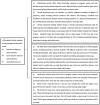Improvement effect of insulin resistance in one-day outpatient service by reducing stress adaptation disorders in patients with gestational diabetes mellitus
- PMID: 39634546
- PMCID: PMC11614661
- DOI: 10.3389/fnut.2024.1450127
Improvement effect of insulin resistance in one-day outpatient service by reducing stress adaptation disorders in patients with gestational diabetes mellitus
Abstract
Aim: Conducted a one-day outpatient service for GDM patients, analyzed the relationship between stress adaptation disorder and insulin resistance in GDM patients after intervention, and tried to provide some new clues for the prevention and treatment of GDM, provide some theoretical basis for the multidisciplinary diagnosis and treatment model of GDM patients.
Methods: 240 GDM women were included in this study, 120 women were included in one-day diabetes clinic management for GDM women as GDM Intervention Group, and 120 GDM women receiving regular dietary education as GDM Control Group. One-day diabetes clinic management including disease knowledge and dietary education, sports education and blood sugar monitoring and personalized issues and follow-up visits, and intervention time lasting for 1 month.
Results: After intervention, the concentration of 2-h postprandial blood glucose, and HOMA-IR were decreased in GDM Intervention Group, while weekly weight gain rate and insulin application rate were significantly lower than GDM Control Group (all p < 0.05). Cortisol and MDA in GDM Intervention Group were significantly lower than GDM Control Group (both p < 0.01). HOMA-IR was positively correlated with weight gain, E, NE and cortisol (r = 0.249, 0.242, 0.663, 0.313, all p < 0.01), E and HOMA-IR were negatively correlated with SOD in GDM Intervention Group (r = -0.306, -0.213, both p < 0.01).
Conclusion: The intervention model in our study was based on the one-day outpatient comprehensive management model of diabetes, which improved the insulin resistance of GDM patients. The possible mechanism was related to the implementation of one-day outpatient intervention measures, which reduced the stress adaptation disorder and oxidative stress injury of GDM patients. At the same time, the implementation of intervention measures reduced the rate of weight gain, which can also alleviate insulin resistance to a certain extent. One-day outpatient treatment has a positive effect on improving insulin resistance in GDM women, which can reduce the risk of maternal and fetal complications.
Keywords: GDM; insulin resistance; one-day outpatient; oxidative stress; stress adaptation.
Copyright © 2024 Feng, Yu, Gu, Feng and Zhang.
Conflict of interest statement
The authors declare that the research was conducted in the absence of any commercial or financial relationships that could be construed as a potential conflict of interest.
Figures
References
LinkOut - more resources
Full Text Sources


